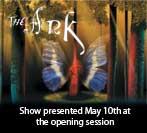Words of Welcome
A Word from Bob Jickling, Co-Chair
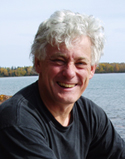 It is getting hot here on earth, our common home. Forget images of gentle warming, or of tomatoes and cucumbers being nurtured in cozy greenhouses, things are really heating up. Climates are changing and our shared household—our oïkos—is threatened. When this common home is threatened all human and more-than-human activities are stressed, and ideas about identity, solidarity, and socio-ecological relations with all forms of life are disrupted. Many Canadians, as inhabitants of a circumpolar country, are beginning to understand this; northern regions are amongst those most affected by climate change. But, this is just one of many issues that threaten the “integrity, stability and beauty of the biotic community.”
It is getting hot here on earth, our common home. Forget images of gentle warming, or of tomatoes and cucumbers being nurtured in cozy greenhouses, things are really heating up. Climates are changing and our shared household—our oïkos—is threatened. When this common home is threatened all human and more-than-human activities are stressed, and ideas about identity, solidarity, and socio-ecological relations with all forms of life are disrupted. Many Canadians, as inhabitants of a circumpolar country, are beginning to understand this; northern regions are amongst those most affected by climate change. But, this is just one of many issues that threaten the “integrity, stability and beauty of the biotic community.”
Wangari Maathai and more recently The Intergovernmental Panel on Climate Change and Al Gore have done much to heighten collective concern about socio-environmental issues—through their work, and through their receipt of the Nobel Peace Prize. They, and countless others, have helped to raise environmental awareness throughout the world. With such heightened awareness, this is an opportune moment for environmental educators. But what work must we do; what stories should we tell?
In the film An inconvenient truth, Al Gore departed from more common story lines to describe climate change as fundamentally a moral issue. Throughout the film, critical links between ecology and economy are apparent, but it is also clear that environmental issues are issues of ecosophy—or philosophy imbued with moral and ethical concern for our oïkos. And, if we want a new ethic, we must tell new stories.
As this 5th World Environmental Education Congress convenes to examine old stories and to construct new ones, I am mindful that we will be building on the work of those who preceded us. Most recently, educators and activists met in Ahmedabad, India, in November 2007, at the Fourth International Environmental Education Conference. Thirty years after the first intergovernmental conference in Tbilisi, I am inspired by a renewed commitment to environmental education and the clear sense of urgency conveyed in the Ahmedabad Declaration. “We no longer need recommendations for incremental change” it states; “we need recommendations that help alter our economic and production systems, and ways of living radically. We need an educational framework that not only follows such radical changes, but can take the lead.” To develop and enact such recommendations, and to enact such radically new stories, educators will need to embrace fundamental changes in ways that knowledge is created, transmitted, and applied.
One of the benefits of gathering for World Congresses is the opportunity to talk, and share stories, with colleagues from around the world. In preparation for the 4th World Environmental Education Congress hosted in Durban, South Africa, in 2007, Heila Lotz-Sisitka stressed the importance of these dialogues. She characterized them as ways to explore meaning together, to think together, and to feel together. Rather than aiming to settle disputes, she argues that dialogue can encourage us to seek deeper meanings, and to question the implicit order—often tacit and hidden—but which structures the way we think and how we do things. In order to strengthen dialogue at this 5th World Environmental Education Congress we pose three questions:
- How can environmental education add meaning to our lives?
- How can environmental education contribute to social innovation?
- How can environmental education contribute to political innovation and influence public policies?
We have vital work to do together. I look forward to your companionship, insights, and creativity as we continue work already begun in shifting collective consciousness towards new stories for gracefully inhabiting our common home. It is with much optimism and excitement and that I welcome you Montreal.
Bob Jickling
Associate Professor
Co-Editor, Canadian Journal of Environmental Education
Faculty of Education
Lakehead University
Acknowledgements: I have borrowed liberally from Aldo Leopold, Al Gore, Annie Ned, Thomas King, The Ahmedabad Declaration, Heila Lotz-Sisitka, David Bohm, Stephen Sterling and Lucie Sauvé.
A Word from Lucie Sauvé, Co-Chair
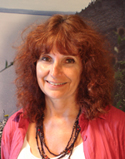 Living together on Earth, our common home is now the most demanding and fundamental ethical and political issue in our artificialized and multicultural societies, where new identities are being forged through new forms of otherness. Together with a citizenship education, concerned with participatory democracy, justice and social equity, this situation calls for environmental education: breathing, drinking, nourishing, clothing, housing, producing and consuming, dreaming and creating, are inextricable from a certain connection to place, and are woven into the fabric of a shared life, in a network of exchanges with the ecosystems that support us, and of which we are an integral part.
Living together on Earth, our common home is now the most demanding and fundamental ethical and political issue in our artificialized and multicultural societies, where new identities are being forged through new forms of otherness. Together with a citizenship education, concerned with participatory democracy, justice and social equity, this situation calls for environmental education: breathing, drinking, nourishing, clothing, housing, producing and consuming, dreaming and creating, are inextricable from a certain connection to place, and are woven into the fabric of a shared life, in a network of exchanges with the ecosystems that support us, and of which we are an integral part.
This Congress addresses vital issues. We must learn to re-inhabit our “house of life” together, responsibly, according to core values, which should be tirelessly clarified and reaffirmed: to learn to live here, together, with other human beings as well as the other forms of life that share and form our environment. From a dominant culture of consumption and individualist accumulation, anchored in prefabricated ideas, we must move towards a culture of belonging, critical engagement, resistance, resilience and solidarity.
As living beings, we are “embodied,” invested, situated, contextualized and rooted – or else in quest of roots. To live – to deploy our being – implies a space-time that is actualized in the “here and now,” and which bears the traces of our previous homes and journeys. “Here” is the bubble of the house, the neighbourhood, the village, the city, the country. “Here” unfurls like a ribbon as we travel distances, every more rapidly, and spreads into the various landscapes of our migrations. “Here” has lately taken on the spherical shape of our small planet, Earth. “Here” is where we are, together, settled or wandering, in our little corner of the world. And always, “here” is anchored in a very tangible reality, which we tend to forget in the autistic universe of our artificial lives.
Also, being human essentially means taking part in a collective journey: we construct our identities in relation to one other, and our environment is woven at the juncture of nature and culture. Learning to “be humans on Earth” means living “here,” together. This is at the core of a global education process.
In the wake of preceding World Environmental Education Congresses, this 5th Congress becomes a political act. Education and the environment are two spheres of interaction with a strong political dimension, because they involve public issues. This Congress aims to contribute to the recognition of the socio-political importance of environmental education and to strengthen this field with the support of the decision makers.
It is with great enthusiasm that we welcome you to participate in the 5th World Environmental Education Congress, and to partake in a spirit of mutual and multicultural exchange. As we share our thoughts and experiences, we will reaffirm the role of environmental education as an essential dimension in the development of persons and societies: in connection with the relationship between the self and other human beings, it focuses on the relationship to the Oïkos, this shared house of life. We are invited to grasp the links between ecology, economy and ecosophy. We will examine how environmental education can help enrich the meaning of our lives, spur social innovation and influence public policies, with a view to making profound transformations so we can overcome the unprecedented challenges of living together on “Earth, our common home.”
Welcome, all of you, to Montréal in May 2009!
Lucie Sauvé,
Chair holder, Canada Research Chair
in Environmental Education
Member, Institut des sciences de l’environnement
Member, Institut Santé et Société
Member, Réseau Dialog (INRS) sur les questions autochtones
Université du Québec à Montréal
A Word from the Mayor of Montréal, Mr. Gérald Tremblay
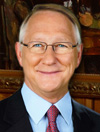 Montréal is an ideal city for hosting educators from throughout the world who are committed to improving the environment. I would like to thank you for your work, which, among its goals, includes saving our planet. Your task is an important one and I believe your proceedings will shed light on issues that affect us as individuals and custodians of "Earth, our common home." Specifically, I am referring to deliberations that gave rise to a theme such as Environmental Education and Urban Challenges, a topic that is of direct concern to that half of our planet’s population residing in cities.
Montréal is an ideal city for hosting educators from throughout the world who are committed to improving the environment. I would like to thank you for your work, which, among its goals, includes saving our planet. Your task is an important one and I believe your proceedings will shed light on issues that affect us as individuals and custodians of "Earth, our common home." Specifically, I am referring to deliberations that gave rise to a theme such as Environmental Education and Urban Challenges, a topic that is of direct concern to that half of our planet’s population residing in cities.
For a metropolis like Montréal, environmental issues have become a true priority. For example, the city has adopted Montréal's First Strategic Plan for Sustainable Development, a natural environment protection policy and a tree policy. We are striving to develop innovative methods. The finest example of this effort is the Saint-Michel environmental complex, which has become an international reference point regarding strategies developed for addressing issues such as recycling and biogas recovery. The environment is at the heart of our concerns because the ultimate issue is the quality of life of our citizens.
Montréal is, accordingly, very proud to be a full partner of the 5th World Environmental Education Congress. I would like to invite our visitors to discover Montréal’s nature museums (Botanical Garden, Biodôme, Insectarium and Planetarium), which are internationally renowned in this regard. Our city also hosts such important institutions as the Secretariat of the Convention on Biological Diversity, which operates under the auspices of the United Nations Environment Programme, and the many civil research centres and organizations that work in the fields of education and environmental awareness. Because of their presence, the United Nations has recognized Montréal as a Regional Centre of Expertise on Education for Sustainable Development.
I would like to thank the organizers and volunteers who have organized this congress and I would like to wish our visitors an excellent stay. I hope they will take the opportunity to discover a thriving, cultural city with a long history that is also very cosmopolitan. We are delighted to welcome you as you pursue your efforts to make the world a better place for future generations.
Gérald Tremblay
A Word from Rector Claude Corbo, UQAM
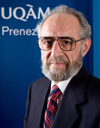 The Université du Québec à Montréal (UQAM) is proud to be at the heart of the organization of the 5th World Environmental Education Congress (5WEEC). This large-scale event is of intrinsic interest to our university in that environmental education stands at the very junction of two fields of research and teaching that are central to our strength: Education Sciences and Environmental Sciences. This Congress is also closely tied to other areas of excellence within our institution, notably the École des sciences de la gestion, with its focus on sustainable development, and the Institut Santé et Société.
The Université du Québec à Montréal (UQAM) is proud to be at the heart of the organization of the 5th World Environmental Education Congress (5WEEC). This large-scale event is of intrinsic interest to our university in that environmental education stands at the very junction of two fields of research and teaching that are central to our strength: Education Sciences and Environmental Sciences. This Congress is also closely tied to other areas of excellence within our institution, notably the École des sciences de la gestion, with its focus on sustainable development, and the Institut Santé et Société.
In bringing together thousands of educators, researchers, program managers, professionals and experts from all fields and walks of life, this socioscientific congress exemplifies UQAM’s steadfast commitment to fostering synergy among universities and other stakeholders engaged in environmental education. Concentrating our actions on clearly-defined targets and projects can only serve to further increase our momentum both here and on the international stage. The environment is a planetary concern, and a collective approach to environmental education is therefore the only responsible option. Our university is honoured to be part of this joint effort to build and disseminate socially-relevant and socially-beneficial knowledge.
In closing, I wish you all a stimulating and enriching Congress. May your discussions be fruitful and lay the groundwork for fertile prospects for the future.
Claude Corbo
Rector
UQAM

